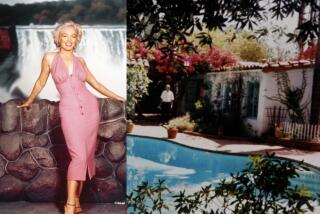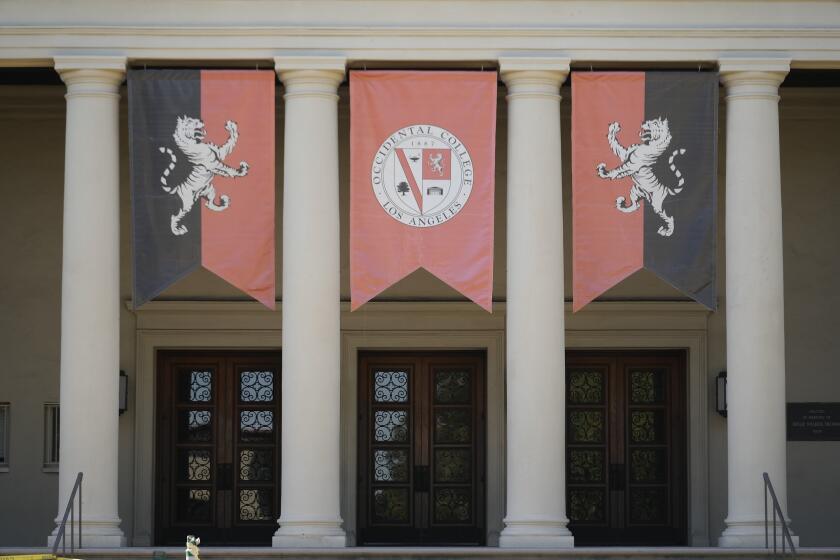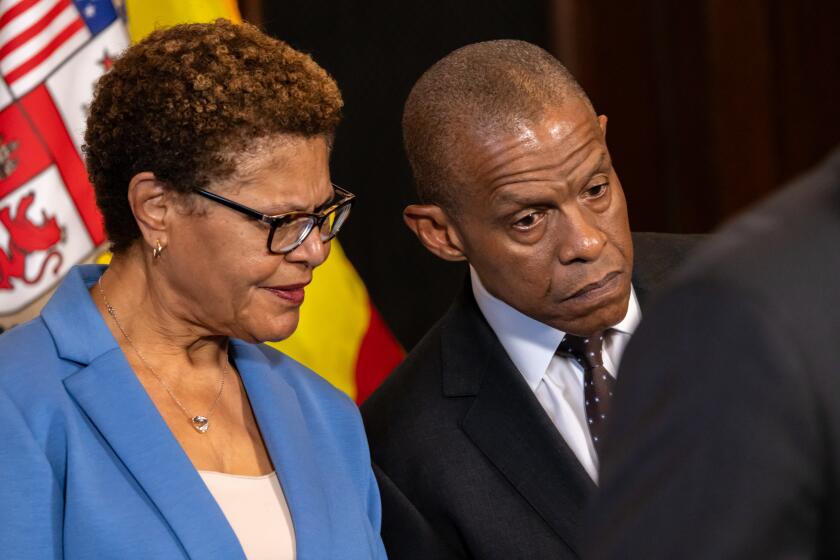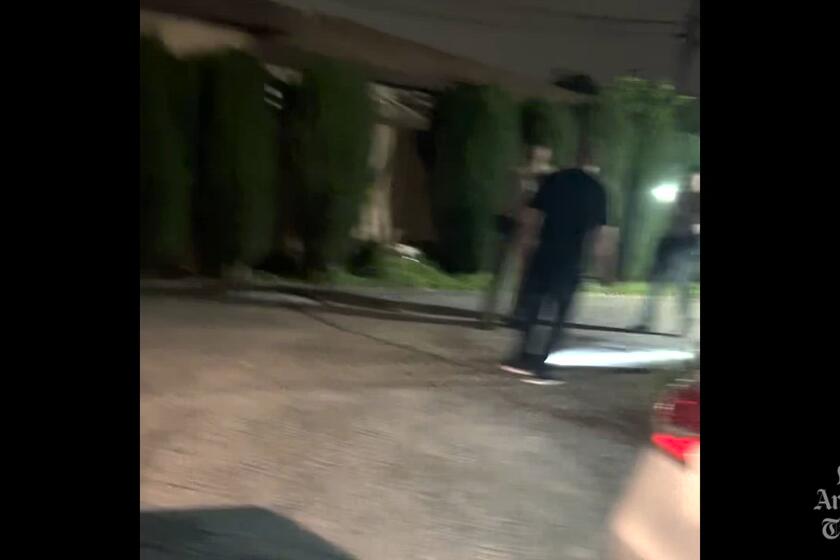Latino Bloc Has Far to Go
You might expect city politics to engross Melchor Moreno and his family.
As owners of La Chispa de Oro, a small restaurant on Los Angeles’ Eastside, they depend heavily on municipal services: garbage collection; street parking; economic development; graffiti and crime prevention.
And America has given Moreno, who emigrated from Mexico 30 years ago, a middle-class life he probably couldn’t have achieved in his homeland. He is impressed with this country’s political system and its fairness.
“I tell everyone,” said Moreno, 63, “you have to vote.”
Yet he hasn’t become a naturalized citizen, though he is eligible, nor has his wife. Their son Demetrio, 21, is a citizen but did not go to the polls in this month’s mayoral election. Another son, Melchor Jr., 26, and a daughter, Claudia, 22, cast their ballots for winner Antonio Villaraigosa.
In many ways, the Morenos represent the slow, fitful political evolution among Latinos in Los Angeles.
Latinos are a growing political force: Voter registration has risen steadily over the last decade, and turnout in the mayoral runoff election was higher than ever. A Newsweek cover story touted Villaraigosa’s victory as proof that “Latinos are making their mark on politics as never before.”
But their political punch in Los Angeles is not nearly what it could be.
“There’s a silent city out there,” said Mike Madrid, public affairs director for the League of California Cities and a former political consultant on Latino voting patterns. “It’s enormous.”
The 1.8 million Latinos in Los Angeles make up nearly half the city’s population. Yet they amount to only a quarter of the city’s registered voters.
Villaraigosa, the first Latino mayor in modern L.A. history, received just 100,000 votes from Latino supporters, according to exit polls. He could nearly have unseated Mayor James K. Hahn without them.
Although many Latinos cannot vote because they are here illegally, about half a million -- an eighth of the city’s population -- are eligible to become citizens but have not, according to a study by the National Assn. of Latino Elected Officials. This despite efforts by the U.S. government to make naturalization easier and quicker.
Low voter registration and turnout are hardly unique to Latinos.
What’s more, there is no single “Latino community.” There are many, with starkly different priorities and motivations: the illegal dayworker who just arrived from Oaxaca, the Zacatecan ranchero who has been here most of his life, the third-generation Mexican American lawyer. In the mix, as well, are Central Americans, Cubans, Argentines and their U.S.-born children. Not all even speak Spanish.
Yet when a city’s largest ethnic group is largely politically absent, it poses challenges for the city and region. One of the dangers is a lack of accountability among public officials, which can lead to scandals such as those in the heavily Mexican and Mexican American city of South Gate a few years ago.
Moreover, in a state where more and more legislation is enacted by initiative, low voter turnout by the largest group weakens the region’s voice, as well as that of the working classes.
There are many reasons for Latinos’ lack of political participation. Like many nonvoters, they tend to be poorer, renters and younger than the rest of the population.
In addition, Latinos here move often, hampering political involvement and organizing, said Marcelo Gaete, a get-out-the-vote organizer with NALEO.
“In New Mexico or San Antonio, Texas, you go to a church or a park and essentially you can have a conversation with the community,” Gaete said.
But every time he sends a mailer to Latino neighborhoods of L.A., he must review the voter files to ensure that the people listed are still there.
Low voter turnout has made it safe for politicians to ignore Latinos in favor of higher-turnout groups. That, in turn, fuels more political apathy among Latinos, Gaete said.
“They don’t get campaign mailers. [Candidates] don’t knock on their doors,” he said. “You got to ask people -- give people an invitation -- to vote and then provide them with information on how to do it.”
Many immigrants from Mexico believe that they will someday return there to live, so instead of getting involved politically in the United States, they visit their native country regularly, investing in houses and contributing to public works projects in their hometowns.
Because they remain so closely connected to Mexico, they don’t easily shed negative attitudes they developed back home toward politics and politicians.
A lot of Mexican immigrants in Los Angeles who have been here long enough to become citizens are from the most rugged frontier ranching areas in states such as Jalisco, Michoacan, Zacatecas, Guanajuato and Sinaloa.
Poor rancheros in those states are fiercely independent. They often associate politics with corruption, and politicians with the lawyers, merchants and wealthy classes of the nearest town -- whom many immigrants accuse of denying them opportunities and forcing them to leave Mexico.
All of this makes Mexicans unlike earlier waves of immigrants when it comes to bloc voting, said Madrid. “A hundred years ago, the Irish, Jews, Greeks, Italians -- an ocean separated them” from their homelands, he said. “They came over a 10-, 20-, 30-year period, and then they’d stop coming.
“That [U.S.-Mexico] border, and the mobility between it, slows the assimilative process.... You don’t have to cross an ocean,” he said. “You don’t have to go through Ellis Island. You don’t have to burn the bridge. The bridge is always there.”
Melchor Moreno Sr. knows that bridge well, though his connection to Mexico is slowly giving way.
He grew up on a small farm in El Vallecito, a hamlet of a few dozen adobe houses in Michoacan.
After coming to Los Angeles at 33, he worked his way from dishwasher to busboy to chef. In 1994, he started La Chispa de Oro, leaving his wife to run things while working two other jobs.
Through it all, he always intended to return to Mexico. “All of us think that way,” he said of Mexican immigrants, “all of us.”
Every year he visited his family home in El Vallecito. He watched fellow villagers who had immigrated to Los Angeles, then Idaho and Utah, use their dollars to build houses in the tiny town, hoping to retire there one day.
“It’s an illusion,” Moreno said. “The reality is you never go back.”
As his children grew older, he realized his life was here. He no longer plans to retire to Mexico. He bought a house on the Eastside.
For years, his three jobs left him with no time for citizenship classes. Naturalization costs about $400, money he’d prefer to use for household or restaurant expenses.
Also, there was “indecision,” he said. He just couldn’t bring himself to do it.
Meanwhile, he developed more of a stake in Los Angeles, as well as some grievances for City Hall.
He’s angry that the city removed several parking spaces on Cesar Chavez Avenue, where his restaurant is, that his customers used. He’s upset that to avoid paying garbage fees, other merchants put their garbage in the public cans along the boulevard. Trash often overflows, he said.
Yet Moreno hasn’t been to a City Council meeting, hasn’t called any city department. Nor has he participated in any local merchant organization.
“They don’t tell you when the meetings are going to be,” he said.
As Moreno hovers in political limbo, his American-born son, Melchor Jr., feels no such ambivalence.
He is a business major at East Los Angeles College, hoping to become a real estate broker. He wants to own a business someday.
He is bilingual and visits Mexico with his parents. But the police there know him for an American and stop him frequently for bribes, he said. He feels far more at home in L.A.
Melchor Jr. isn’t deeply involved in politics -- but he takes voting seriously. He reads newspapers and watches television news. He has political attitudes that some in his family don’t like; he opposes driver’s licenses for illegal immigrants.
He votes, he said, so he can “make a difference. Latinos need to go out there and vote. They’re the first ones to complain about everything. and they’re the last ones to do anything.”
Father and son reflect the changes in L.A.’s varied Latino community, pulled both by the past and the future.
“His point of view of politics is that it’s something that’s similar to what’s in Mexico” and thus to be avoided, Melchor Jr. said of his father. “Mine is: Go out and vote.”
More to Read
Start your day right
Sign up for Essential California for news, features and recommendations from the L.A. Times and beyond in your inbox six days a week.
You may occasionally receive promotional content from the Los Angeles Times.






